The Denver Nuggets appear in control after finishing with a 108-103 win over the Los Angeles Lakers on Thursday in Game 2 of the Western Conference Finals. Though the Nuggets have a 2-0 series lead entering Game 3 in Los Angeles on Saturday, both teams showed they will fight to the very end.
Below are five major takeaways from Denver’s Game 2 win.
Denver Nuggets’ Jamal Murray rectifies sluggish start
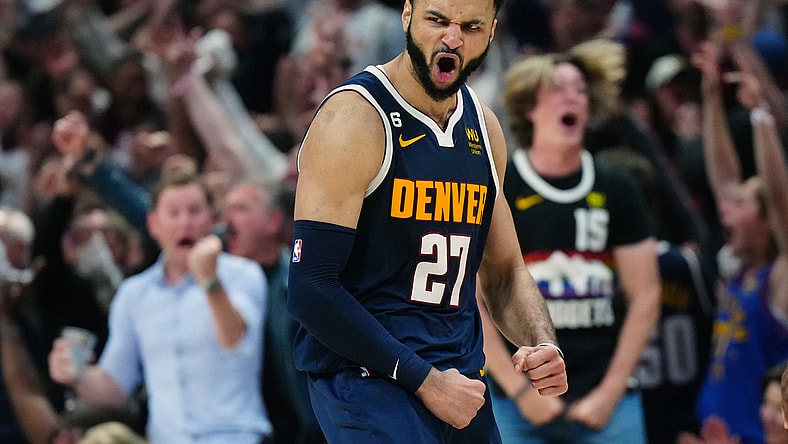
Denver’s point guard played like he did in the NBA bubble three years ago. Aggressive, composed and prolific. Murray finished with 37 points while shooting 11-for-24 from the field, 6-for-14 from 3 and 9-for-10 from the free-throw line. Murray also put up 10 rebounds, five assists and four steals. That marked a much better showing than when he had only 14 points through three quarters. To do this, Murray played the entire second half.
Nuggets center Nikola Jokic still collected another triple double in points (23), rebounds (17) and assists (12). But he also needs help. With Murray hitting shots from the outside, the Los Angeles Lakers became scrambled with trying to cover both the perimeter and the paint.
Related: Nikola Jokic’s Game 1 play could foreshadow Denver Nuggets championship success
Denver Nuggets relied on their depth
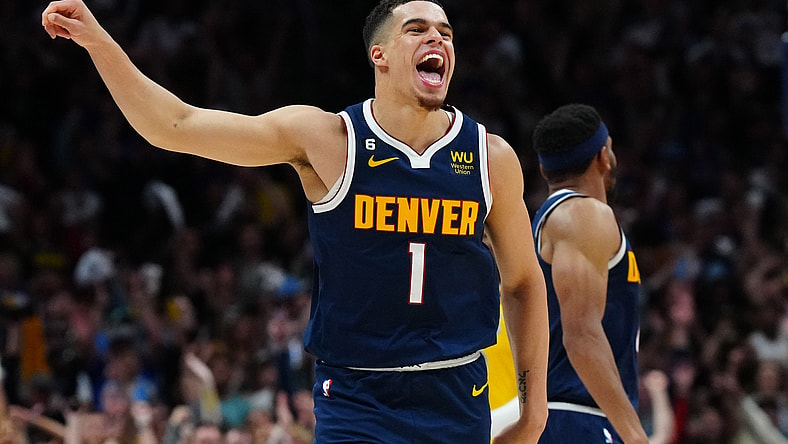
The Nuggets prevailed late in the game and the non Murray-Jokic minutes earlier in the game by leaning on its numerous role players.
Michael Porter Jr. made timely 3s (16 points on 5-for-10 overall and 4-for-7) by appearing ready to fire away off of catch-and-shoot opportunities. Bruce Brown punished the Lakers for leaving him open by posting 12 points on 5-for-11 shooting and 2-for-4 from deep.
Aaron Gordon (10 points) offered an interior presence and Kentavious Caldwell-Pope (eight points) became a perimeter threat. That frankly gave the Lakers too many defensive concerns to worry about, which resulted in Murray, Jokic and their supporting cast punishing them equally.
What should we make of LeBron James and Anthony Davis’ effort?
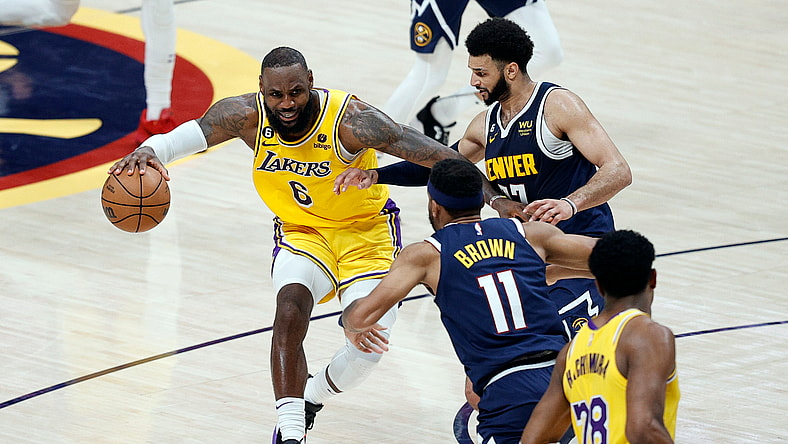
How did James perform in Game 2? Depends on what footage you watch. He looked gassed when he committed a turnover while the Lakers trailed, 108-103, with 8.1 seconds left and when he missed a layup as the Nuggets held a 103-99 cushion with 24.7 seconds remaining.
He appeared out of rhythm when he missed all six of his shots from 3-point range. And he may have had a senior moment when he lost control of the ball on a wide-open dunk in the first half.
James’ stat line looked respectable: 22 points, 10 assists and nine rebounds. He also played Jokic effectively on defense in the third quarter (while also getting away with some fouls). But as shown in Game 2, the Lakers need significantly more from James.
It would help if Davis could have mitigated some of James’ struggles. He had 18 points on 4-for-15 shooting after dropping 40 points in Game 1. But this wasn’t a product of Davis just not showing up to play every other night. Davis played aggressive enough to go draw trips to the free-throw line (9-for-11) as well as collect 14 rebounds and four assists. Nor did the Lakers not have enough help from their role players. Austin Reaves had 22 points, including a 3 that cut the Nuggets’ lead to 101-99 with 1:07 left. Rui Hachimura also added 21 points.
That still wasn’t enough mainly because the Lakers need James to produce more. Despite his physical limitations and fatigue during the playoffs, James often became effective enough with his shots at the rim, passes and hustle plays. But James looked out of sorts in Game 2 during the worst possible moments.
Related: Sportsnaut’s NBA Playoff and Finals predictions
Rui Hachimura’s breakout game wasn’t a fluke for the Los Angeles Lakers
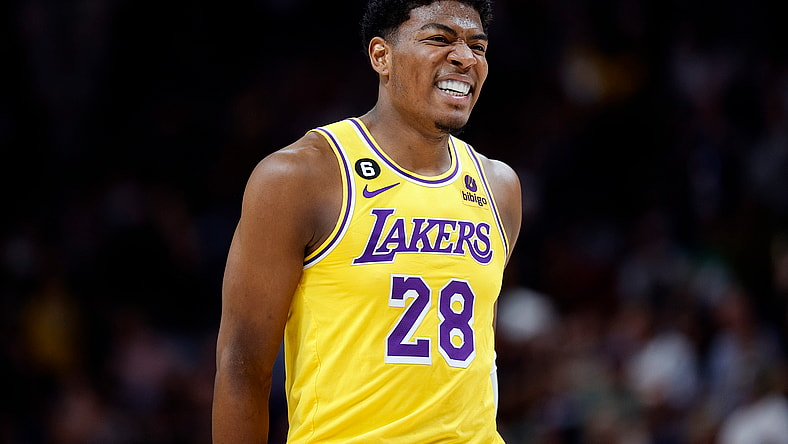
First, the Memphis Grizzlies left him wide open and dismissed his shot-making afterwards. Then, the Nuggets scoffed at his late-game defensive effectiveness on Jokic. But as the Lakers have learned since acquiring him before the trade deadline, Hachimura has proven he is the real deal.
Hachimura represented one of the Lakers’ bright spots with 21 points while shooting 8-for-10 from the field, 1-for-2 from 3 and 4-for-4 from the free-throw line. He attacked the rim with aggressiveness. He stayed ready on catch-and-shoot opportunities. And with James and Davis failing to produce offensively, Hachimura stayed patient with taking advantage of the Nuggets’ defensive attention on the Lakers’ stars.
Denver appeared willing to live with Hachimura’s production so long as James and Davis couldn’t establish a consistent rhythm. To Hachimura’s credit, he stayed ready. Though the Lakers have also seen Reaves, D’Angelo Russell, Dennis Schroder and Lonnie Walker IV make big plays on both ends of the floor, Hachimura has shown he can make open shots and make defensive stops.
The Washington Wizards surely wish Hachimura could have offered such qualities consistently during his 4 1/2 seasons there. But Hachimura has benefitted from not having the pressure to do so with James and Davis on the team.
Los Angeles Lakers fielded a better starting lineup
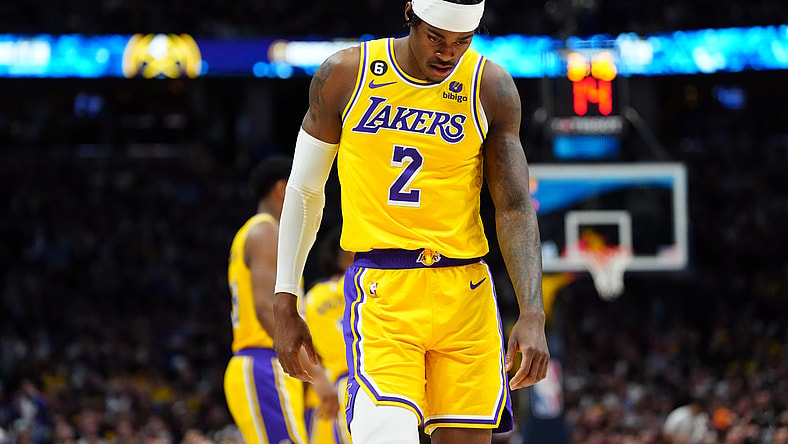
The Lakers began Game 2 with more energy than in Game 1, and the reasons went beyond adjusting to Denver’s high altitude. The Lakers also seemed more prepared with a bigger lineup. After going with a small lineup in Game 1 that featured Schroder, Russell and Reaves, the Lakers went big with subbing out Schroder and featuring Jarred Vanderbilt to complement Anthony Davis. The Lakers weren’t as overwhelmed, but it still became a lost cause.
The Lakers lost on the boards in Game 2 (49-40) after also losing on the glass in Game 1 (Nuggets won 47-30). The Lakers also struggled in transition defense. At least the Lakers didn’t have to play from behind as much as they did in Game 1 and become more physical with Jokic from the beginning.
That just begs the question: why did the Lakers go small to begin the series? The Lakers did this in hopes their smaller lineup could run faster through the altitude. They also calculated Jokic will do enough damage that it’s a lost cause to try to match up with him. So why not zag? But as clearly shown in Game 2, the Lakers are better off having multiple defenders available to guard Jokic besides Davis.
Mark Medina is an NBA Insider for Sportsnaut. Follow him on Twitter and on Instagram.